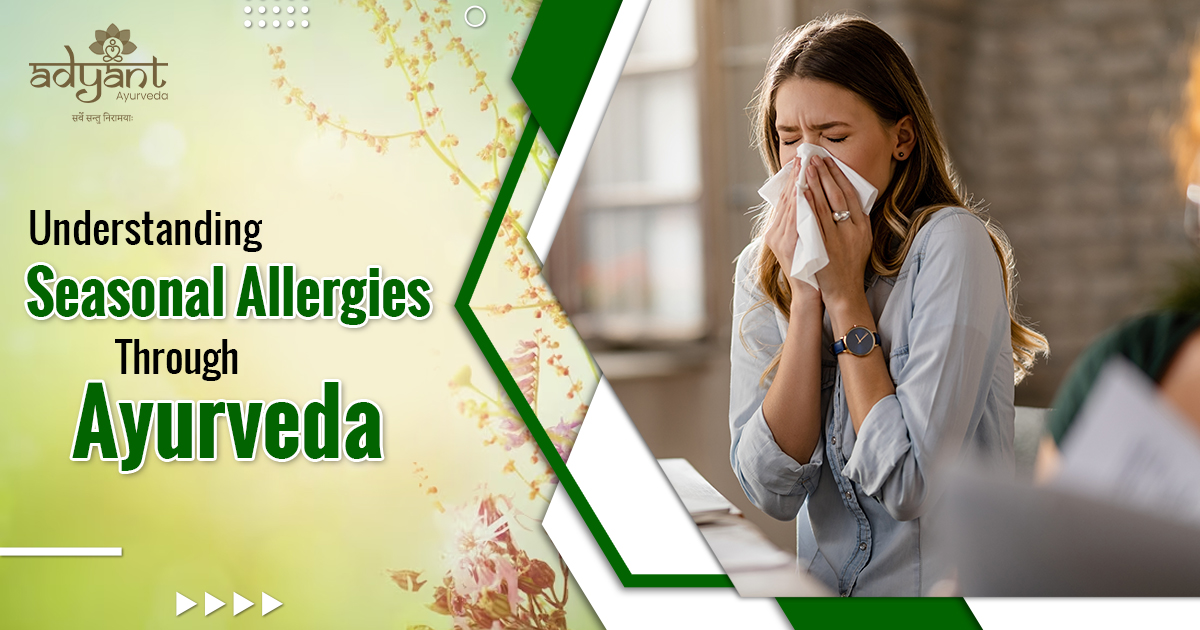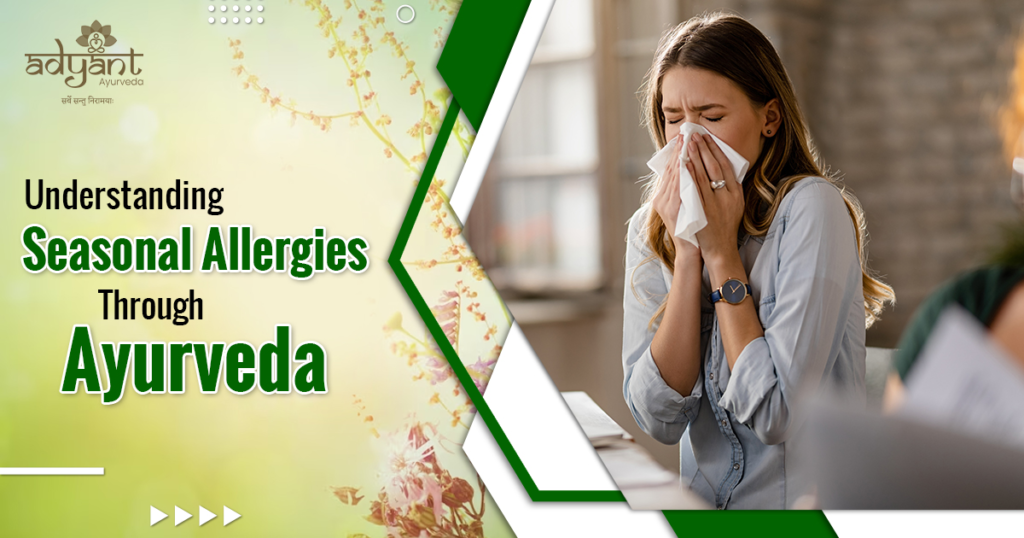Table of Contents
Toggle
As seasons change, many people experience discomfort due to seasonal allergies. While modern medicine offers symptomatic relief, Ayurveda, the ancient holistic healing system, provides a natural and long-term solution by addressing the root cause of allergies.
At Adyant Ayurveda, we specialize in Ayurvedic allergy treatment that focuses on balancing the doshas and strengthening the immune system. This article explores the Ayurvedic approach to seasonal allergies, common symptoms, herbal remedies, Panchakarma therapies, and self-care tips for effective and lasting relief.
What Are Seasonal Allergies?
Seasonal allergies, also known as allergic rhinitis or hay fever, occur due to hypersensitivity to allergens such as pollen, dust, mold, and seasonal changes. These allergies are immune system reactions that lead to symptoms like:
✅ Sneezing and nasal congestion
✅ Itchy, watery eyes
✅ Runny or stuffy nose
✅ Coughing and throat irritation
✅ Skin rashes or hives
✅ Fatigue and headaches
Ayurvedic Perspective on Seasonal Allergies
Doshas and Allergies
In Ayurveda, allergies result from an imbalance in the doshas (Vata, Pitta, and Kapha), which govern different bodily functions. When the doshas are disturbed, they create Ama (toxins), leading to allergic reactions.
🔹 Vata Imbalance: Causes dry cough, wheezing, sneezing, and restlessness.
🔹 Pitta Imbalance: Triggers inflammation, skin rashes, burning eyes, and acidity.
🔹 Kapha Imbalance: Leads to nasal congestion, sinusitis, watery discharge, and heaviness.
Prakriti and Allergy Susceptibility
Each person has a unique body constitution (Prakriti) that determines their susceptibility to allergies. Understanding your Prakriti helps in identifying which allergens affect you the most and how to restore balance through diet, lifestyle, and herbal remedies.
Ayurvedic Treatment for Seasonal Allergies
1. Herbal Remedies for Allergy Relief
Ayurveda uses natural herbs with anti-inflammatory, antihistamine, and immune-boosting properties to manage allergies:
🌿 Turmeric (Haridra) – Reduces inflammation and strengthens immunity.
🌿 Neem – Detoxifies the blood and purifies the skin.
🌿 Tulsi (Holy Basil) – Acts as a natural decongestant and soothes respiratory issues.
🌿 Licorice (Yashtimadhu) – Soothes the throat and reduces irritation.
🌿 Sitopaladi Churna – A classical Ayurvedic formulation for respiratory allergies.
🌿 Haridrakhand – A potent remedy for allergic rhinitis and skin allergies.
✅ Recommended: Consult an Ayurvedic doctor for the right dosage and combination of these herbs.
2. Panchakarma Therapies for Allergy Detox
🌿 Nasya (Nasal Therapy) – Clears sinuses and reduces congestion.
🌿 Vamana (Therapeutic Emesis) – Removes excess Kapha and detoxifies the respiratory system.
🌿 Virechana (Purgation Therapy) – Eliminates Pitta toxins and relieves skin allergies.
🌿 Raktamokshana (Blood Purification) – Helpful for chronic skin allergies and rashes.
These therapies remove Ama (toxins), cleanse the system, and prevent allergic reactions from recurring.
3. Ayurvedic Diet for Seasonal Allergy Prevention
Following an Ayurvedic diet can help strengthen immunity and prevent allergies:
✔ Eat seasonal fruits & vegetables rich in antioxidants.
✔ Include anti-inflammatory spices like turmeric, ginger, and black pepper.
✔ Drink warm herbal teas (ginger, tulsi, or licorice tea) to soothe symptoms.
✔ Avoid dairy & processed foods that can trigger mucus buildup.
✔ Stay hydrated with warm water and herbal decoctions.
4. Ayurvedic Lifestyle Tips for Allergy Prevention
🧘 Practice Pranayama (Breathing Exercises) – Enhances lung function and reduces congestion.
🚶 Stay Active – Engage in gentle exercise or yoga to maintain circulation.
🛌 Follow a Regular Sleep Routine – Strengthens the immune system.
🛁 Use Neti Pot for Nasal Cleansing – Removes allergens from the nasal passage.
🏡 Keep Your Environment Clean – Reduce exposure to dust and allergens.
Why Choose Ayurveda for Allergy Treatment?
✅ Holistic Healing – Ayurveda treats the root cause of allergies rather than just symptoms.
✅ Natural & Safe – No side effects, unlike conventional antihistamines or steroids.
✅ Customized Treatment – Based on individual Prakriti (body type) and dosha imbalance.
✅ Long-Term Benefits – Strengthens immunity to prevent future allergic reactions.
At Adyant Ayurveda, our experienced Ayurvedic doctors create personalized treatment plans to help you overcome seasonal allergies naturally.
Seeking Treatment from the Best Ayurveda Hospital
For effective Ayurvedic allergy treatment, consult Adyant Ayurveda, the best Ayurveda hospital in Bangalore. We combine:
🌿 Traditional Ayurvedic therapies
🌿 Expert doctors with years of experience
🌿 Customized diet & lifestyle guidance
🌿 Authentic herbal medicines
Get lasting relief from allergies with safe, natural, and holistic healing.
📞 Book Your Consultation Today! – Call 9972541009
FAQs About Seasonal Allergies & Ayurveda
🔹 Q: What are the common symptoms of seasonal allergies?
✅ Sneezing, runny nose, itchy eyes, congestion, and throat irritation.
🔹 Q: How does Ayurveda treat seasonal allergies?
✅ Ayurveda treats allergies by balancing doshas, detoxifying the body, and strengthening immunity.
🔹 Q: Which Panchakarma therapy is best for allergies?
✅ Nasya for nasal allergies, Vamana for excess Kapha, and Virechana for skin allergies.
🔹 Q: Can Ayurveda permanently cure allergies?
✅ Ayurveda reduces allergy symptoms significantly by addressing the root cause and strengthening immunity, leading to long-term relief.
🔹 Q: How do I know my dosha imbalance for allergies?
✅ An Ayurvedic doctor will analyze your Prakriti (body constitution) and symptoms to determine the dosha causing allergies.
Final Thoughts: Embrace Ayurveda for Long-Term Allergy Relief
With allergies becoming more common due to pollution and lifestyle factors, Ayurveda offers a natural and long-lasting solution. By identifying dosha imbalances, using herbal medicines, following Panchakarma therapies, and adopting a dosha-balancing diet and lifestyle, you can effectively manage seasonal allergies.
At Adyant Ayurveda, we provide the best Ayurvedic treatment for allergies in Bangalore, helping patients heal naturally and holistically.
📞 Book a consultation today! Call 9972541009 or visit www.adyantayurveda.com









